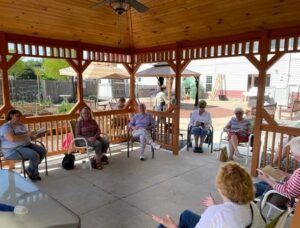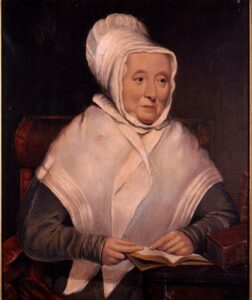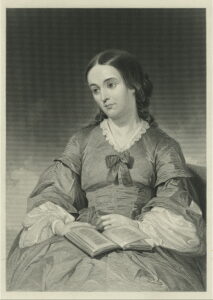By David Wilkening, Contributing Writer

Photo/Submitted
MILFORD – Don’t forget the Great Books, please. But Oprah’s Book Club was the main inspiration for Milford librarian Anne Berard’s starting a book club.
“You have to mention the ‘Great Books’ program as an influence for me, which was longer standing but it had more academic underpinnings,” said Berard, facilitator for the library’s Center Book Group. “Oprah Winfrey’s club was more rank and file, and it influenced me because it definitely got a lot of people reading books and talking about what they read.” The group regularly meets at 10 a.m. on the third Tuesday of the month at the Milford Senior Center.
Don’t forget their place in history either or leave out the efforts of some prominent Boston women who were early forerunners of today’s modern-day book club movement in the U.S. They included Anne Hutchinson, Hannah Adams, Hannah Mather Crocker and Margaret Fuller.
As public places ranging from restaurants to museums look to making comebacks since the pandemic, book clubs are also poised to meet again in person. So are senior versions, which share in common with all such clubs a debt to New England women.
Book clubs have a long history
Oprah Winfrey’s launch of her book club in 1996―which prompted Berard’s own effort in 1999―has generally been called a “turning point in the history of book clubs.”
Great Books goes back further into history. Originated in 1929 by Robert Maynard Hutchins, who developed a curriculum based on a canon of famous Western works of literature and philosophy, the Great Books Foundation was established in 1947 and the Great Books Program was developed. It quickly caught on in Chicago when two university educators, Robert Maynard Hutchins and Mortimer Adler, started a series of Great Books “Shared Inquiry Seminars.” They inspired many other programs.
Going back further in Massachusetts’ history, Anne Hutchinson (1591-1643) had no formal education but was an avid reader. A religious dissident in England, she was forty-three years old when she arrived in Boston. She began holding meetings with local women to discuss what she viewed as the too-strict teaching of the local Puritans, which led to her banishment from the state. Her gatherings inaugurated what has been called a “tradition of women’s analytical discussion of serious subjects.”

Photo/Courtesy of American Antiquarian Society
Hannah Adams is often described as the first American woman to professionally earn a living through writing. She is predominantly known for her essays. In the late 1700s, she joined a reading circle in her village of Medfield. The circle read and discussed literary works and shared their own poetry and prose.
Journalist Margaret Fuller was the first American female war correspondent. In 1840, she hosted the first known bookstore-sponsored discussion club in the U.S. during a meeting at a friend’s Boston home. Through the “Conversations,” the women used a Socratic method to discuss anything from literature to history. Fuller took up such philosophical questions as “What were we born to do?” These gatherings have been called the first women’s book club in the U.S.

Photo/From an engraving based on a painting by artist Alonzo Chappel
The traditional early reason for women joining book clubs was often due to their exclusion from mainstream, men-only organizations. But they are no longer on the fringes and have become one of the most important driving forces in the book world. Although exact numbers are not easily found, there are an estimated five million Americans belonging to book clubs, as of a few years ago. Of those, an estimated 70 percent of members were women. A 2014 survey of American women who read at least one book a month found that 56 percent were in book clubs, and the majority of those were clubs that met in person.
Milford club is mostly older adults
“Almost all members are in their 70s, 80s and even 90s,” said Berard. “Almost there myself.” She is 53.
The club of approximately 20 members also reflects national trends in being largely composed of women.
Like the rest of the world, the club suspended meetings during the pandemic. Then came Zoom virtual meetings followed by smaller groups meeting outdoors. The group is now back to regular meetings.
The question of how book clubs like this one fared during the virus shutdown is still largely unanswered. But some preliminary studies found that membership continued to grow during that time, though only slightly.
There are various benefits for book club participation, some of them more relevant perhaps for seniors. These include socialization, which also is a major motivation in the Milford club. Making new friends is another major goal for members. There’s also an element of education or learning new information.
That was evident in Milford for several books. A particularly timely one during the worst of the pandemic was “The Code Breaker: Jennifer Doudna, Gene Editing, and the Future of the Human Race.” It was a non-fiction book authored by American historian Walter Isaacson. It was best described as “how Nobel Prize winner Jennifer Doudna and her colleagues launched a revolution that will allow us to cure diseases, and fend off viruses.” — a popular choice for this era.
RELATED CONTENT:
The Grammy and Granddaughter Book Club (fiftyplusadvocate.com)
Sudbury author helps others unlock their writing potential (fiftyplusadvocate.com)
Cambridge publisher brings the joys of books to kids (fiftyplusadvocate.com)












